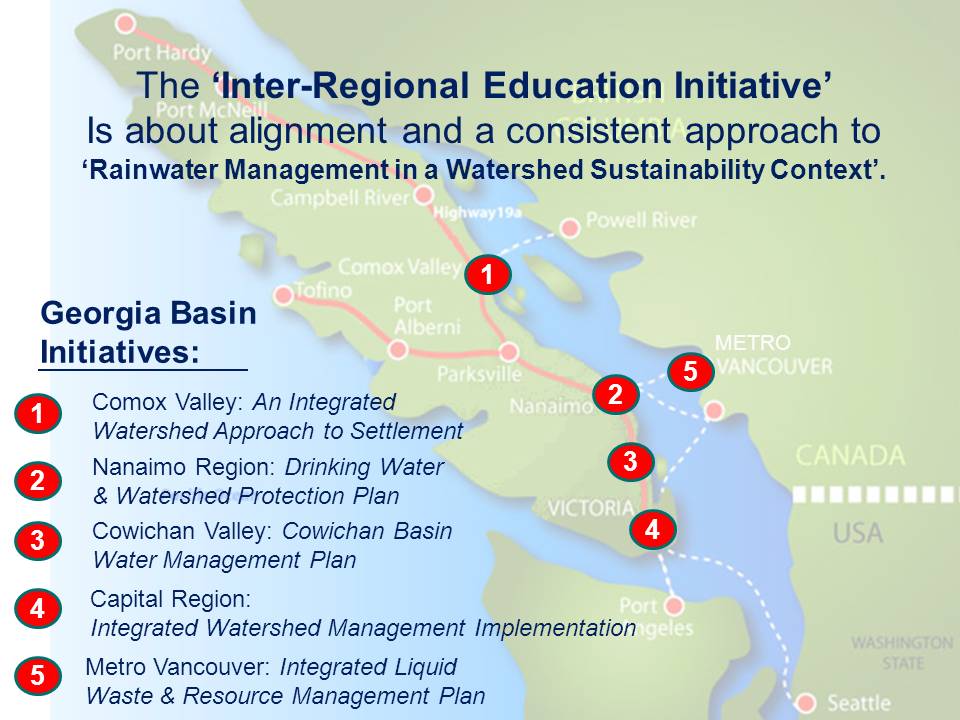Inter-Regional Education Initiative: from ‘proof of approach’ on Vancouver Island in 2012 to full-scale implementation in 2013
Collaborative Initiatives Will Help Local Governments in BC Better Deliver on Regulatory Objectives and Compliance
In November 2012, the Partnership for Water Sustainability in British Columbia completed a year-long ‘proof of approach’ on Vancouver Island for an Inter-Regional Educational Initiative for Rainwater Management in a Watershed Sustainability Context (IREI). This initiative is designed to accelerate implementation of Living Water Smart and Green Communities principles and desired outcomes in the local government setting.
 “Four regional districts, representing 90% of the Vancouver Island population, have aligned efforts to implement the IREI. The IREI is providing local governments with the tools and understanding they need to change our land ethic for the better. The IREI is about integrating the Site with the Watershed and Stream,” reports Derek Richmond, Manager of Engineering with the City of Courtenay. He is Chair of the CAVI-Convening for Action on Vancouver Island initiative.
“Four regional districts, representing 90% of the Vancouver Island population, have aligned efforts to implement the IREI. The IREI is providing local governments with the tools and understanding they need to change our land ethic for the better. The IREI is about integrating the Site with the Watershed and Stream,” reports Derek Richmond, Manager of Engineering with the City of Courtenay. He is Chair of the CAVI-Convening for Action on Vancouver Island initiative.
“In 2012, each region hosted an IREI sharing and learning event or process. 24 local governments participated. The Cowichan Valley led off with a Water Balance Forum in March. Then the Nanaimo Region hosted a Water Balance Model Workshop in June where the Partnership unveiled the web-based Drainage Infrastructure Screening Tool.”
“In the first half of 2012, the Comox Valley adapted a Capital Region precedent to create a Draft Landowners Guide for Water-Wise Development. To close out the 2012 program, the Capital Region hosted a workshop where the Partnership unveiled the beta version of the web-based Water Balance Model Express for Landowners.”
“In 2013, the IREI is moving from ‘proof of approach’ on Vancouver Island to full-scale implementation, including Metro Vancouver and beyond. Inter-regional collaboration will help leverage more with the same resources. Everyone will be able to better deliver on regulatory objectives and compliance.”
Framework for Collaboration
Kim Stephens, Partnership Executive Director, reports that the approach in bringing together the four Vancouver Island regions and the Metro Vancouver region is shaped by these considerations:
- All have over-arching plans in place.
- All have funded activities that they are planning to do in 2012 and beyond.
- While the regions are linked by common interests, they are not dependent on each other.
- Collaboration, alignment and consistency in application will create opportunities for everyone to be more effective.
- The ‘convening for action’ educational program will align with regional priorities and workloads, not add to workloads.
- The inter-regional program will link activities so that everyone can share experiences, benefit from lessons learned, and align efforts with the Living Water Smart and Green Communities initiatives.
“ Each region has developed a provincially significant plan or approach to achieve water and watershed sustainability,” observes Kim Stephens. “All are striving to implement a consistent regional approach that protects and/or restores natural watershed function over time.”
Each region has developed a provincially significant plan or approach to achieve water and watershed sustainability,” observes Kim Stephens. “All are striving to implement a consistent regional approach that protects and/or restores natural watershed function over time.”
To Learn More:
Click on Inter-Regional Education Initiative for ‘Rainwater Management in a Watershed Sustainability Context’ to access the homepage for the initiative.

In March 2012, the Cowichan Valley Regional District hosted an inter-regional Water Balance Model Forum at the Duncan campus of Vancouver Island University


